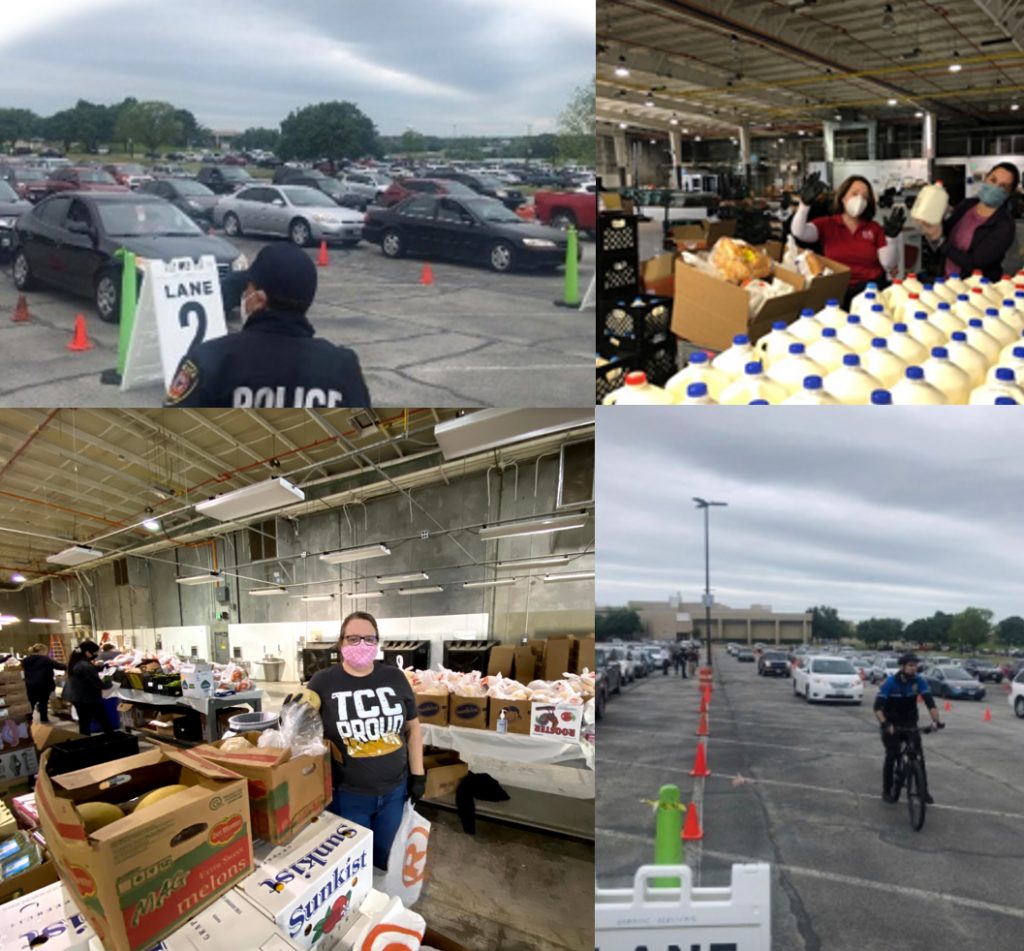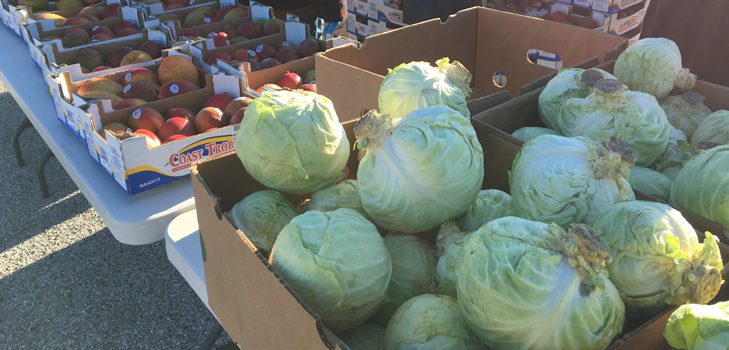On March 16, 2020, as TCC faculty, staff and administrators returned from Spring Break to a paused academic calendar, the first order of business was, of course, how to get student learning back up and running. For a small group of them, though, another question loomed large — how to handle the Community Food Market scheduled for March 20.
TCC Northwest’s Community Food Market is a longstanding, monthly mobile food pantry open to students and to the general public. Prior to the pandemic, on Community Food Market days, folks would begin lining up outside of the hanger in the WATB building in the morning and then, once food distribution began, would proceed through a predetermined path through the hangar, around a series of tables with different food offerings supplied by Community Link and the Tarrant Area Foodbank. On average, the food pantry served about 300 families per month in this model and was staffed by around 15 to 20 volunteers, mostly TCC faculty, staff and students. But in March 2020, it was clear pretty quickly on the return from Spring Break that the old model would not be workable.
“We knew the community’s need had not decreased. It had increased, and so we knew we had to find a way to continue the market,” said Lisa Benedetti, dean of Humanities. Benedetti is also on the Board of Community Link and leads the overall effort to plan and execute the Community Food Market at TCC Northwest.
So, a team consisting of Benedetti, faculty members Mike Esquivel and Lourdes Ramboa, Coordinator of the Center for English Language Learning ESL & ESOL Lourdes Davenport, Lead Groundskeeper Alma Castoreno, Coordinator of Academic Support Services Ryan Ferguson and TCC Northwest Police Captain VaNessa Harrison got to work on an alternative solution that would maintain the safety of participants as well as volunteers. The first decision was to make it a drive-through event.
“From the outset, there was a concern about how to do this safely,” said Esquivel, who teaches in the Logistics and Supply Chain Management program. He said the group knew they would need personal protective equipment such as gloves and masks and that there would need to be logistical changes to how the market would operate to support the drive-through format. “We would need to spread the tables out to create distance between the volunteers, and then deal with the having some volunteers working inside, putting boxes of food together, and other volunteers working as runners to take the food out to the cars — it was these sorts of logistical things that we had to start working out right away, he said.”
According to Harrison, the group anticipated that the need would be great, so they had to plan for various levels of participation from the community. “We were faced with the challenge of serving potentially twice as many people and in an entirely new format,” she said. Harrison continued, “We relied on volunteers from other campus police units and devised a traffic pattern to line up the cars as simply and efficiently as possible. We tried to anticipate every scenario and plan accordingly.”
 Once the cars were lined up, it would be necessary to get some information from participants before they received their food, which is where Davenport’s team comes in. She explained, “Community Link and Tarrant Area Food Bank each have a set of data they need us to collect, so we had to figure out how to safely approach the cars and gather that information, making sure everyone is staying distanced and wearing masks.”
Once the cars were lined up, it would be necessary to get some information from participants before they received their food, which is where Davenport’s team comes in. She explained, “Community Link and Tarrant Area Food Bank each have a set of data they need us to collect, so we had to figure out how to safely approach the cars and gather that information, making sure everyone is staying distanced and wearing masks.”
Benedetti said demand surged in March and especially in April, which was when the crashing economy really started to hit people. “We ultimately served more than 400 families in March, when Tarrant Area Food Bank estimates reached almost 2,000 people,” she said. “April was the peak. We served almost 700 families that day. Again, the need in the community was pronounced. We saw fewer families at each event after that, but only because Tarrant Area Food Bank started offering more mobile food pantries across more of the county, so the need continued, but the food was more widely distributed.”
After those first few months, as the team continued to learn more about hosting a drive-through event like this, the plan began to evolve. A major breakthrough came on a cold, rainy day in December as the group faced sending volunteers out into the elements over and over again to run food to cars. “Initially, for the first few months, we had to keep the plan as simple as possible, but then eventually the volunteers, the community, and our officers, they all became more familiar with the planning and some learning happened,” Harrison said. “When we had that cold, rainy day, we were able to pivot to a more complicated traffic pattern, but one that would allow us to get the cars right up to the hangar.” This new pattern eliminated the need for runners to take the food out to the parking lots and also allowed for service to happen much more efficiently.
Since March 2020, more than 4,300 families have received food through the drive-through Community Food Market.
This team is grateful for all the hard work put into the effort by the TCC Police Department, which sent officers from throughout the College to work these events. They are also grateful for the volunteers who signed up through the Tarrant Area Food Bank to work the event. “We had volunteers from Amazon and Verizon,” said Benedetti, “as well as National Guard troops who came out to work in the parking lots and load food into cars.”
As the team begins to prepare for the return of in-person instruction in Fall 2021, plans are already underway to re-launch the in-person version of the market in September. The challenges will be different as they will contend with a more fully utilized parking lot, but Harrison thinks the sacrifices the campus will have to make in making space in the parking lot for folks to park will be worth it. “That is the sacrifice you are making as an employee of TCC Northwest, for people to be able to take advantage of this vital service,” she said.
Benedetti is looking forward to the return to campus and being able to tap into the campus community to continue volunteering at the event. “Re-engaging our faculty, staff and students in this way will be very exciting. We will work collaboratively to do this safely and efficiently and we will continue to serve our community,” she said.
For more information about the Community Food Market, including upcoming dates and how to volunteer, please visit Tarrant Area Food Bank’s website.

